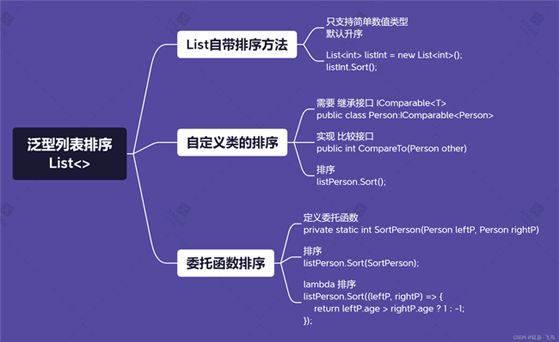| using System;
using System.Collections.Generic;
using System.Linq;
using System.Text;
using System.Threading.Tasks;
namespace L_List_sort
{
public class Person:IComparable<Person>
{
// 属性
public string name;
public int age;
// 构造
public Person(string name, int age)
{
this.name = name;
this.age = age;
}
// 重写字符串
public override string ToString()
{
return "name: " + this.name + " age: " + this.age;
}
// 实现比较接口
public int CompareTo(Person other)
{
// 根据返回值排序 升序
if (this.age > other.age)
{ // 大于0 放后面
return 1;
}
else
{ // 小于 0 放前面
return -1;
}
}
}
class Program
{
static void Main(string[] args)
{
Console.WriteLine("泛型数组的排序");
#region 知识一 List自带排序方法
Console.WriteLine("--------------------List自带排序方法");
List<int> listInt = new List<int>();
listInt.Add(4);
listInt.Add(2);
listInt.Add(3);
listInt.Add(1);
Console.WriteLine("-------排序前");
PrintList<int>(listInt);
Console.WriteLine("-------排序后");
// 排序
listInt.Sort();
PrintList<int>(listInt);
#endregion
#region 知识二 自定义类的排序
Console.WriteLine("--------------------自定义类的排序");
List<Person> listPerson = new List<Person>();
listPerson.Add(new Person("张三", 20));
listPerson.Add(new Person("李四", 18));
listPerson.Add(new Person("王五", 31));
listPerson.Add(new Person("曹操", 45));
Console.WriteLine("-------排序前");
PrintList<Person>(listPerson);
Console.WriteLine("-------排序后");
// 继承排序(需要继承 接口 :IComparable<Person>)
listPerson.Sort();
PrintList<Person>(listPerson);
#endregion
#region 知识三 通过委托函数进行排序
Console.WriteLine("--------------------通过委托函数进行排序");
listPerson.Clear();
listPerson.Add(new Person("张三", 20));
listPerson.Add(new Person("李四", 18));
listPerson.Add(new Person("王五", 31));
listPerson.Add(new Person("曹操", 45));
Console.WriteLine("-------排序前");
PrintList<Person>(listPerson);
// 使用委托==>函数排序
listPerson.Sort(SortPerson);
Console.WriteLine("-------排序后");
PrintList<Person>(listPerson);
// Lambda 再次排序
listPerson.Sort((leftP, rightP) => {
return leftP.age > rightP.age ? 1 : -1;
});
Console.WriteLine("-------Lambda 再次排序后");
PrintList<Person>(listPerson);
#endregion
Console.ReadLine();
}
// 排序函数
private static int SortPerson(Person leftP, Person rightP)
{
// 根据返回值排序 升序
if (leftP.age > rightP.age)
{ // 大于0 放后面
return -1;
}
else
{ // 小于 0 放前面
return 1;
}
}
// 打印列表中元素的内容
private static void PrintList<T>(List<T> nList)
{
if (nList.Count == 0)
Console.WriteLine("--列表为空数据");
for (int i = 0; i < nList.Count; i++)
{
Console.WriteLine(nList[i].ToString());
}
}
}
}
|
